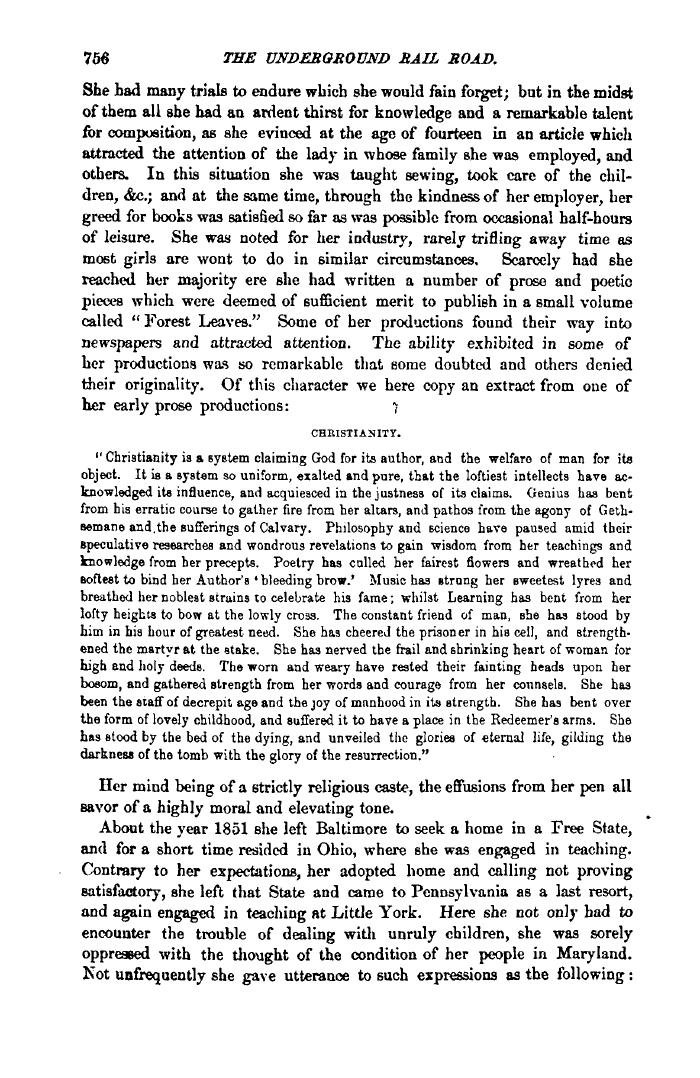 |
||||
 |
||||
| 766 THE UNDERGROUND RAIL ROAD. She bad many trials to endure which she would fain forget; bat in the midst of them all she had an ardent thirst for knowledge and a remarkable talent for composition, as she evinced at the age of fourteen in an article which attracted the attention of the lady in whose family she was employed, and others. In this situation she was taught sewing, took care of the children, &c.; and at the same time, through the kindness of her employer, her greed for books was satisfied so far as was possible from occasional half-hours of leisure. She was noted for her industry, rarely trifling away time as most girls are wont to do in similar circumstances. Scarcely had she reached her majority ere she had written a number of prose and poetic pieces which were deemed of sufficient merit to publish in a small volume called " Forest Leaves." Some of her productions found their way into newspapers and attracted attention. The ability exhibited in some of her productions was so remarkable that some doubted and others denied their originality. Of this character we here copy an extract from one of her early prose productions: ? CHRISTIANITY. " Christianity ia a system claiming God for its author, and the welfare of man for its object. It is a system so uniform, exalted and pure, that the loftiest intellects have acknowledged its influence, and acquiesced in the justness of its claims. Genius has bent from his erratic course to gather fire from her altars, and pathos from the agony of Geth-aemane and.the sufferings of Calvary. Philosophy and science have paused amid their speculative researchea and wondrous revelations to gain wisdom from her teachings and knowledge from her precepts. Poetry has called her fairest flowers and wreathed her softest to bind her Author's ' bleeding brow.' Music has strong her sweetest lyres and breathed her noblest strains to celebrate hia fame; whilst Learning has bent from her lofty heights to bow at the lowly cross. The constant friend of man, she has stood by him in hia hour of greatest need. She has cheereJ the prisoner in his cell, and strengthened the martyr at the stake. She bas nerved the frail and shrinking heart of woman for high and holy deeds. The worn and weary have rested their fainting heads upon her bosom, and gathered strength from her words and courage from her counsels. She baa been the staff of decrepit age and the joy of mnnhood in its strength. She has bent over the form of lovely childhood, and suffered it to have a place in the Redeemer's arms. She has stood by the bed of the dying, and unveiled the gloriea of eternal life, gilding the darkness of the tomb with the glory of the resurrection." Her mind being of a strictly religious caste, the effusions from her pen all savor of a highly moral and elevating tone. About the year 1851 she left Baltimore to seek a home in a Free State, and for a short time resided in Ohio, where she was engaged in teaching. Contrary to her expectations, her adopted home and calling not proving satisfactory, she left that State and came to Pennsylvania as a last resort, and again engaged in teaching at Little York. Here she not only bad to encounter the trouble of dealing with unruly children, she was sorely oppressed with the thought of the condition of her people in Maryland. Not (infrequently she gave utterance to such expressions as the following: |